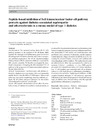Identificador persistente para citar o vincular este elemento:
https://accedacris.ulpgc.es/jspui/handle/10553/75281
| Título: | Peptide-based inhibition of IκB kinase/nuclear factor-κB pathway protects against diabetes-associated nephropathy and atherosclerosis in a mouse model of type 1 diabetes | Autores/as: | Oguiza, Ainhoa Recio Cruz, Carlota Pilar Lazaro, Iolanda Mallavia, Beñat Blanco, Julia Egido, Jesus Gomez-Guerrero, Carmen |
Clasificación UNESCO: | 320502 Endocrinología | Palabras clave: | Atherosclerosis Diabetes Inflammation Nephropathy Nuclear factor-κB, et al. |
Fecha de publicación: | 2015 | Proyectos: | SAF2012-38830 PI14/00386 PIE13/00051 FP7-HEALTH-2013-INNOVATION-1-602422 |
Publicación seriada: | Diabetologia (Berlin) | Resumen: | Aims/hypothesis The canonical nuclear factor-κB (NF-κB) pathway mediated by the inhibitor of NF-κB kinase (IKK) regulates the transcription of inflammatory genes involved in the pathogenesis of diabetes, from the early phase to progression and final complications. The NF-κB essential modulator binding domain (NBD) contained in IKKα/β is essential for IKK complex assembly. We therefore investigated the functional consequences of targeting the IKK-dependent NF-κB pathway in the progression of diabetes-associated nephropathy and atherosclerosis. Methods Apolipoprotein E-deficient mice with diabetes induced by streptozotocin were treated with a cell-permeable peptide derived from the IKKα/β NBD region. Kidneys and aorta were analysed for morphology, leucocyte infiltrate, collagen, NF-κB activity and gene expression. In vitro studies were performed in renal and vascular cells. Results NBD peptide administration did not affect the metabolic severity of diabetes but resulted in renal protection, as evidenced by dose-dependent decreases in albuminuria, renal lesions (mesangial expansion, leucocyte infiltration and fibrosis), intranuclear NF-κB activity and proinflammatory and pro-fibrotic gene expression. Furthermore, peptide treatment limited atheroma plaque formation in diabetic mice by decreasing the content of lipids, leucocytes and cytokines and increasing plaque stability markers. This nephroprotective and anti-atherosclerotic effect was accompanied by a decline in systemic T helper 1 cytokines. In vitro, NBD peptide prevented IKK assembly/activation, p65 nuclear translocation, NF-κB-regulated gene expression and cell proliferation induced by either high glucose or inflammatory stimulation. Conclusions/interpretation Peptide-based inhibition of IKK complex formation attenuates NF-κB activation, suppresses inflammation and retards the progression of renal and vascular injury in diabetic mice, thus providing a feasible approach against diabetes inflammatory complications. | URI: | https://accedacris.ulpgc.es/handle/10553/75281 | ISSN: | 0012-186X | DOI: | 10.1007/s00125-015-3596-6 | Fuente: | Diabetologia (Berlin), [ISSN 0012-186X], v. 58, p. 1656–1667 |
| Colección: | Artículos |
Los elementos en ULPGC accedaCRIS están protegidos por derechos de autor con todos los derechos reservados, a menos que se indique lo contrario.
